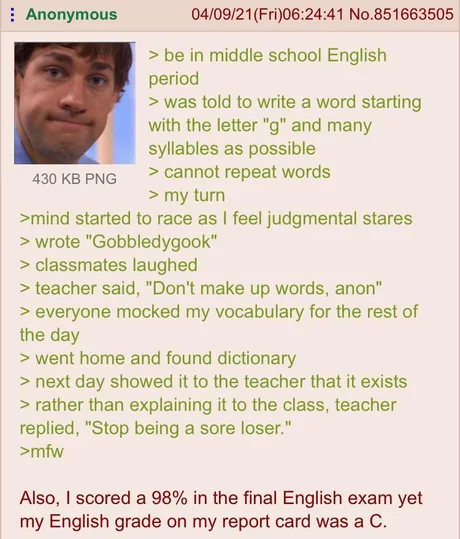this post was submitted on 14 Jul 2024
973 points (98.2% liked)
Greentext
4607 readers
1383 users here now
This is a place to share greentexts and witness the confounding life of Anon. If you're new to the Greentext community, think of it as a sort of zoo with Anon as the main attraction.
Be warned:
- Anon is often crazy.
- Anon is often depressed.
- Anon frequently shares thoughts that are immature, offensive, or incomprehensible.
If you find yourself getting angry (or god forbid, agreeing) with something Anon has said, you might be doing it wrong.
founded 1 year ago
MODERATORS
you are viewing a single comment's thread
view the rest of the comments
view the rest of the comments

Too many teachers assume if they admit they were wrong, the students will get more insolent, as if sensing weakness. I've briefly been an assistant teacher in a middle school, and I found that on the contrary, students seem to appreciate an earnest admission of mistake and calmly accept the apology. Even some students that would be insolent in other situations. When it's clear you're wrong and the student knows it, pretending you're right won't do any good. Acting in a respectable manner will get you more respect.
Some teachers are just shitheads though.
Never left school, mentally and physically.
My experience with this just taught me that eventually most teachers will just default to authority. They will tell you to stop questioning or stop being difficult in order to prevent the class from getting off-track. Instead they miss a teachable moment both about academic integrity and being a decent person.
https://youtu.be/EqZjo_gSBVM
Works as a parent too. The kid thinks they're a genius for knowing something the parent/teacher doesn't, learns a valuable lesson that adults can be wrong, and learns how to find truth. When we conflict, I say, "let's look that up," whip out my phone and look for 2-3 reliable sources on whatever the subject is, and read it together. Then I explain why I thought what I thought, which is a valuable lesson in how biases can cloud our judgement, and sometimes I find I'm wrong about something related as well.
I'm usually right, but sometimes I'm wrong, and I think that's awesome.